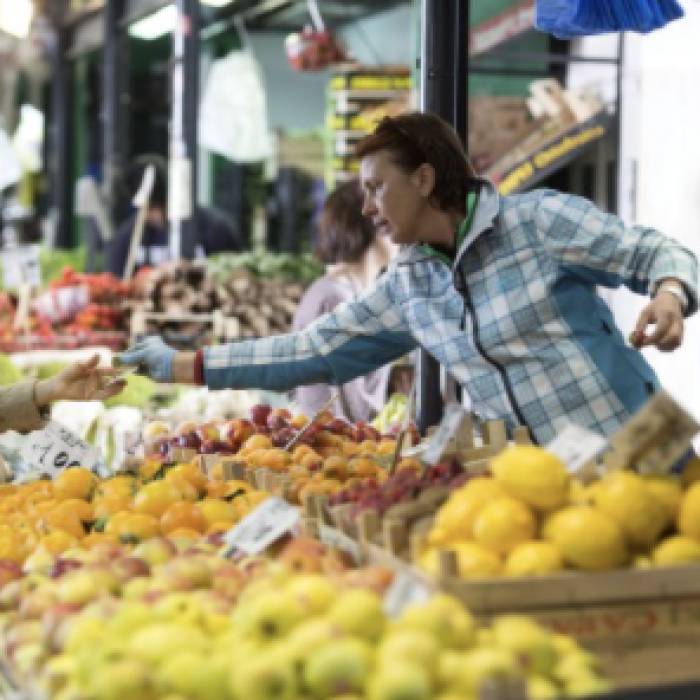Digital agriculture report: Rural e-commerce development experience from China

The ‘Digital Agriculture Report: Rural E-commerce Development—Experience from China’, produced by FAO and Zhejiang University, has been officially released. The publication examines how rural e-commerce could advance the digital transformation of agri-food systems, including increasing production efficiency, expanding farmers’ market access, improving poverty alleviation, fostering agricultural entrepreneurship, and attracting young generations back to their villages for economic revival and rural revitalization.
It is highlighted that an enabling ecosystem with favourable government policies and strategies, public-private partnerships and innovative business models is of great importance to accelerate the development of rural areas in China, and generate larger economic, social and environmental impacts. As the largest developing country in the world, the experience of digital agriculture transformation in China could be shared with other developing countries.
The report also discusses some of the challenges encountered and lessons learned during the development of rural e-commerce, as well as the proposals for the way forward.
The report is available in English and can be downloaded here.
WEBINAR - E-commerce for agriculture and rural development

The agricultural sector will face enormous challenges to feed the projected 9.6 billion people who will inhabit the planet by 2050. The COVID-19 pandemic has resulted in severe economic and social distress around the world, triggering several negative impacts on agri-food systems. However, e-commerce entered the outbreak period ahead of time, especially in the agri-food sector, and with the new opportunities it creates, it is considered a potential solution to this difficult situation.
To continue its active work in promoting digitilization of the agricultural sector, FAO, in close collaboration with the International Telecommunication Union (ITU) and Zhejiang University (ZJU), participates in the World Summit on the Information Society (WSIS) Forum.
Following WSIS Action Line C7 on eAgriculture that focuses on using ICT applications for e-agriculture, the jointly organized webinar "E-commerce for agriculture and rural development" will aim at enhancing knowledge and exchanging experiences, involving a wide range of experts from various organisations, institutions, academia, and private sector businesses, including the Inter-American Development Bank (IDB), Alibaba, and African young e-commerce entrepreneurs.
During the event, the Digital Agriculture Flagship Report will be presented, which is based on experiences with successful business models and on results of technology applications in the field of rural e-commerce in China.
The webinar takes place on Friday, 7 May 2021, 15:00–16:00 (CEST).
For more information on this event and to register, please click here.

Socio-legal empowerment and agency of small-scale farmers in informal markets
Producers trading in informal agricultural markets in low- and middle-income countries make daily choices concerning their livelihood and marketing strategies. Different contexts present varying degrees of market power and knowledge asymmetries across value chains and trading relations. In general...
FAO Food Price Index rises sharply

Global food commodity prices rose sharply in November to their highest level in nearly six years, according to a benchmark United Nations report released on 3 December 2020.
The FAO Food Price Index averaged 105.0 points during the month, up 3.9 percent from October and 6.5 percent higher than its value a year earlier. The monthly increase was the sharpest since July 2012, putting the index at its highest level since December 2014, the Food and Agriculture Organization said.

经合组织—粮农组织 2020‑2029 农业展望
《2020-2029年农业展望》由经济合作与发展组织(经合组织)及联合国粮食及农业组织(粮农组织)合作编写。报告凝聚了两个组织在商品、政策和国家方面的专门知识以及合作成员国的贡献,对国家、区域和全球农产品市场未来十年的前景进行年度评估。本次报告专门分析了2019冠状病毒病(COVID-19)疫情的短期形势及其对粮食和农业的影响。

2020年农产品市场状况
《2020年农产品市场状况》旨在讨论全球和国内农业和食品市场促进经济、社会和环境可持续发展的政策和机制。报告围绕全球贸易和发展讨论的核心趋势和挑战展开分析。主题涵盖贸易和市场的演变、粮食和农业全球价值链的形成、发展中国家小农参与价值链和市场的程度、数字技术对市场的变革性影响。 《2020年农产品市场状况》围绕上述主题讨论了能够促进包容性经济增长并利用市场助力实现《2030年议程》及其可持续发展目标的政策和制度。
The State of Agricultural Commodity Markets (SOCO) 2020

FAO has launched The State of Agricultural Commodity Markets 2020 (SOCO 2020). The report aims to discuss policies and mechanisms that promote sustainable outcomes – economic, social and environmental – in agricultural and food markets, both global and domestic.
The analysis is organized along the trends and challenges that lie at the heart of global discussions on trade and development. These include the evolution of trade and markets; the emergence of global value chains in food and agriculture; the extent to which smallholder farmers in developing countries participate in value chains and markets; and the transformative impacts of digital technology on markets.
Along these themes, SOCO 2020 discusses policies and institutions that can promote inclusive economic growth and also harness markets to contribute towards the realization of the 2030 Agenda and its Sustainable Development Goals.
The report also looks at policy responses to address the impacts of the COVID-19 pandemic on food value chains, both nationally and globally.
The report is available in all six UN languages and can be downloaded here.

Food Outlook – Biannual Report on Global Food Markets
Food markets will face many more months of uncertainty related to the COVID-19 pandemic. However, while most markets are braced for a major global economic downturn, the agri-food sector is likely to display more resilience to the crisis than other sectors. Food Outlook is published by the Trade and...

通过高效物流应对新冠病毒疫情对粮食价值链的影响
新冠病毒疫情大流行已经发展成为21世纪最严峻的全球卫生、社会和金融挑战。它不但影响人们的生活、生计和营养,也影响到粮食贸易、粮食供应链和市场。
我们邀请各位参加本次在线磋商会,从贸易和物流的角度分享各自国家应对有关新冠病毒防控措施对粮食安全和农业影响的范例、最佳实践和个案研究。

Small farms, small food businesses and sustainable food and nutrition security - an overview
The important role that small farms play in supporting rural livelihoods, conserving biodiversity and maintaining traditional landscapes, rural traditions and cultural heritage is widely accepted. Nevertheless, they are often under the radar of the agriculture policy mechanisms, which tend to focus...
